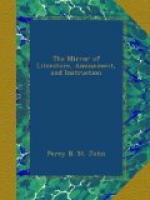(To be concluded in our next.)
[6] Lord Byron’s conception
of Faliero’s character and motives
appears
to us to be mistaken; but what is to be said to the
countless
impertinences and ingraftments upon history which
M.
de la Vigne has introduced into his French play on
the
same
subject?
[7] “Marin Falieri,
dalla bella moglie, altri la gode, ed egli
la
mantiene.”
[8] This officer was chief
of the artisans of the Arsenal, and
commanded
the Bucentaur—for the safety of which, even
if an
accidental
storm should arise, he was responsible with his
life.
He mounted guard at the Ducal Palace during an
interregnum,
and bore the red standard before the new doge on
his
inauguration; for which service his perquisites were
the
Ducal
Mantle, and the two silver basins from which the doge
scattered
the regulated pittance which he was permitted to
throw
among the people.—Amelot de la Houssaye,
79.
* * * * *
MANNERS & CUSTOMS OF ALL NATIONS.
* * * * *
CAMBRIAN SUPERSTITIONS.
We noticed the preparation of this work at p. 315 of our last volume, and there gave a few anticipatory extracts. The author is Mr. W. Howells, of Tipton, whose good fortune it has been to secure a list of Subscribers to his work, of gratifying length and flattering rank. The origin of the volume is curious enough, and is thus explained in the Preface:
“My inducement for presenting to the public these tales of ’by-gone days’ was the advertisement of the very Rev. Archdeacon Beynon, which appeared in the Carmarthen Journal, of May 21, 1830, proposing a reward of twenty guineas, with a medal value three guineas, for the best printed English Essay, 8vo. containing 500 pages, on the Superstitions, Ghosts, Legends, &c. of all parts of the principality, to be delivered before February 3, 1831. Now when the limited period proposed for the collection of 500 pages of matter, and the above little adjective all is considered, it must appear obvious that such an Herculean labour is not capable of being accomplished by one individual alone.—Imagining it, therefore, to be a matter of impossibility to perform what the very reverend gentleman requires, I cannot consistently with propriety offer myself as a candidate, but will say—’Palmam qui meruit ferat.’
“I have had considerable trouble to collect the stories which appear in the work, being also two years from attaining my majority, and having so short a period to collect them, as the book is hastily ushered before a discerning public, I trust they will overlook any imperfections which may appear.”




